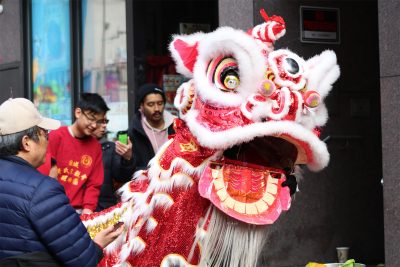The Lunar New Year began Friday, with Bostonians in and out of Chinatown celebrating the first days of the Year of the Ox virtually — a stark contrast to last year.

The Lunar New Year signifies the start of spring, and with it, the beginning of a new agricultural cycle, said Hua Dong, coordinator of Northeastern University’s Chinese program. Each year is assigned an animal based on a 12-year zodiac cycle.
Dong said the meaning of the holiday has taken on other definitions throughout history.
“It has signified, since the beginning, [the time for] the farmers to start planting,” Dong said. “But then, it’s also the time to rejuvenate from the past.”
Dong added that the Lunar New Year is typically celebrated by an array of Boston businesses and cultural institutions.
In Chinatown, one of the main festivities is usually the traditional lion dance and parade, Dong said. Dancers bring blessings and light firecrackers as a way of welcoming in a “bustling” New Year.
This year’s parade was cancelled. The state’s COVID-19 regulations limit outdoor gatherings to 25 people.
Outside of Chinatown, this year’s events also included a virtual lecture and arts showcase hosted by the Museum of Fine Arts, Boston and a New Year’s Eve blessing service by Boston’s Fo Guang Buddhist Temple.
The Pao Arts Center at the Boston Chinatown Neighborhood Center hosted online events including a workshop where children and families could create their own lion heads out of cardboard and a conversation when families could share their Lunar New Year traditions with each other, said the center’s Director Cynthia Woo.
The center also hosted an online session Saturday when participants could share their hopes for the New Year on a virtual wishing tree — replacing the traditionally community-based event.
Woo added that this year’s virtual celebrations allowed families to participate at their own pace.
“You can be a little more passive and contribute to user-generated content,” she said, “or you could watch a video on your own time and actually make a lion head on your own or you could make dumplings on your own.”
Dong said the online activities provide a necessary break from the isolating nature of the pandemic.
“I think different organizations are trying to do something different to really break down that kind of isolation and bring the community together,” she said.
The commerce in Chinatown has also been impacted by the pandemic, Woo added.
“It’s quiet,” she said. “Businesses are struggling. I think that’s something [impacting] all of the city, but especially in Chinatown.”
Woo added that Chinatown faces unique challenges, such as having fewer parking spaces and narrower streets — two vital factors for the outdoor dining that kept many Boston restaurants afloat.
Restaurants in Chinatown reported that business has slowed since the pandemic began, and crowds became less comfortable dining out.
But Dong and Woo both suggested another reason business has been lacking in Chinatown is the racism tied to COVID-19.
“I think the community in Chinatown got hit first because people were thinking that Chinatown is a place where people can get the virus,” Dong said, “So, they stopped going to the restaurants.”
At the start of the pandemic, Bostonians were afraid to go into Chinatown — a fear that continues to impact local businesses, Woo said.
But Dong said the New Year may also bring a change of luck, even though the pandemic and anti-Asian racism persist.
“This is the most important holiday in the whole year because it signifies the beginning of something new,” she said. “Especially after 2020, we couldn’t go any worse. It’s time to get rid of all the bad luck.”






















































































































